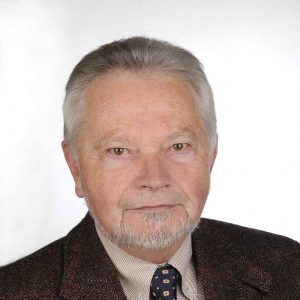prof. dr hab. Adam Patkowski

Zainteresowania naukowe
- Struktura, dynamika i oddziaływania miękkiej fazy skondensowanej (koloidy, ciecze tworzące szkło, polimery, biopolimery)
- Statyczne i dynamiczne (korelacja fotonów) metody rozpraszania światła (PCS, FPI), promieniowania synchrotronowego (SAXS, XPCS), neutronów (SANS) i fluorescencji (FCS)
Wykształcenie
- I Liceum Ogólnokształcące im. Karola Marcinkowskiego w Poznaniu – matura 1966
- Magister fizyki – Uniwersytet A. Mickiewicza, Wydział Matematyki, Fizyki i Chemii, 1971,
- Doktor fizyki – Uniwersytet A. Mickiewicza, Wydział Matematyki, Fizyki i Chemii, 1975,
- Habilitacja z fizyki – Uniwersytet A. Mickiewicza, Wydział Matematyki, Fizyki i Chemii, 1982,
- Tytuł profesora nauk fizycznych – Uniwersytet A. Mickiewicza, Wydział Matematyki, Fizyki i Chemii, 1992,
- Profesor zwyczajny – Fizyka – Uniwersytet A. Mickiewicza, Wydział Matematyki, Fizyki i Chemii, 1996
Inne informacje
Zatrudnienie
Uniwersytet im. Adama Mickiewicza w Poznaniu, Wydział Mat-Fiz-Chem, potem Wydział Mat-Fiz, potem Wydział Fizyki:
- asystent: 1971-1974,
- starszy asystent: 1974-1975,
- adiunkt: 1975-1983,
- docent (prof. UAM): 1983-1992,
- profesor: 1992-1996,
- profesor zwyczajny: od 1996
Staże zagraniczne
- Research Associate, Chemistry Department, State University of New York at Stony Brook, Associated with Prof. B. Chu, 3 years (1975-1980),
- Visiting Professor, Chemistry Department, University of Bielefeld, Germany, Sept. 1985 – Feb. 1987,
- Project Leader, Max Planck Institute for Polymer Research, Mainz, Germany, 1991-1999,
- Visiting Professor, Forschungszentrum Juelich, Istitut fuer Festkoerperforschung, Weiche Materie, 1.03.-31.08.2006.
Przynależność do towarzystw naukowych
- Polskie Towarzystwo Fizyczne
- Polskie Towarzystwo Biofizyczne
2019
Pochylski, Mikołaj; Gapiński, Jacek; Wojnarowska, Z; Paluch, M; Patkowski, Adam
Nature of intramolecular dynamics in protic ionic glass-former: insight from ambient and high pressure Brillouin spectroscopy Journal Article
In: Journal of Molecular Liquids, vol. 282, pp. 51 - 56, 2019, ISSN: 0167-7322.
Abstract | Links | BibTeX | Tagi: Brillouin scattering, High pressure, Intramolecular dynamics, Ionic liquids
@article{POCHYLSKI201951,
title = {Nature of intramolecular dynamics in protic ionic glass-former: insight from ambient and high pressure Brillouin spectroscopy},
author = {Mikołaj Pochylski and Jacek Gapiński and Z Wojnarowska and M Paluch and Adam Patkowski},
url = {http://www.sciencedirect.com/science/article/pii/S0167732219302417},
doi = {https://doi.org/10.1016/j.molliq.2019.02.131},
issn = {0167-7322},
year = {2019},
date = {2019-01-01},
journal = {Journal of Molecular Liquids},
volume = {282},
pages = {51 - 56},
abstract = {Proton conducting materials play an important role in a variety of electrochemical devices. Especially, the class of protic ionic glass-formers with fast water-independent proton transport within the Grotthuss mechanism has been envisioned as promising fuel cell electrolytes. Nevertheless, despite a number of reports on protic ionic glasses the description of proton transport phenomenon in these systems is still incomplete. Herein, we employed the Brillouin scattering technique to investigate the intramolecular dynamics of acebutolol hydrochloride, protic ionic glass-former with isomerization ability. The studies performed at ambient and elevated pressure revealed the fast relaxation dynamics that may control the proton conductivity, especially at temperatures T < Tg where the vehicle mechanism contribution is negligible.},
keywords = {Brillouin scattering, High pressure, Intramolecular dynamics, Ionic liquids},
pubstate = {published},
tppubtype = {article}
}
Proton conducting materials play an important role in a variety of electrochemical devices. Especially, the class of protic ionic glass-formers with fast water-independent proton transport within the Grotthuss mechanism has been envisioned as promising fuel cell electrolytes. Nevertheless, despite a number of reports on protic ionic glasses the description of proton transport phenomenon in these systems is still incomplete. Herein, we employed the Brillouin scattering technique to investigate the intramolecular dynamics of acebutolol hydrochloride, protic ionic glass-former with isomerization ability. The studies performed at ambient and elevated pressure revealed the fast relaxation dynamics that may control the proton conductivity, especially at temperatures T < Tg where the vehicle mechanism contribution is negligible.